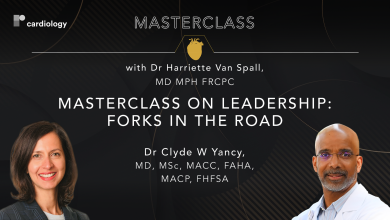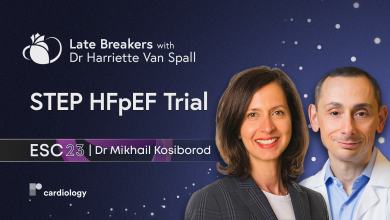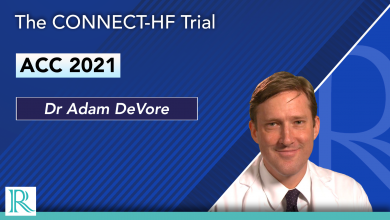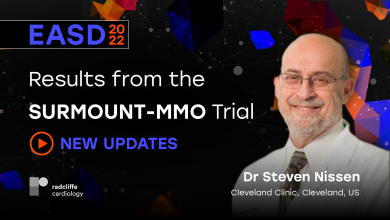Search results
Author(s):
Harriette Van Spall
,
Clyde W Yancy
Added:
9 months ago
Join Masterclass host, Dr. Harriette Van Spall (McMaster University, CA), in an in-depth interview with Dr. Clyde W. Yancy (Northwestern University, US).
Dr. Yancy, an internationally respected leader and mentor in cardiology, holds positions as the Vice Dean of Diversity and Inclusion, Magerstadt Professor of Medicine, and Chief of the Division of Cardiology at Northwestern University's…
View more
Author(s):
Todd Rudo
Added:
3 years ago
Atrial fibrillation (AF) is the most common arrhythmia encountered in clinical practice, with a prevalence that substantially increases with age. Both the loss of atrial mechanical function and a rapid, irregular ventricular response contribute to potentially significant symptoms, including palpitations, fatigue, chest discomfort, light headedness or syncope. Additionally, AF is associated with a…
View more
Author(s):
Harriette Van Spall
,
Mikhail Kosiborod
Added:
7 months ago
ESC 2023 – Late-Breaker host, Dr Harriette Van Spall (McMaster University, CA) is joined by Dr Mikhail Kosiborod (Saint Luke’s Mid America Heart Institute, US) to discuss the findings from the STEP HFpEF trial (NCT04788511).
Around half of patients with heart failure have heart failure with preserved ejection fraction (HFpEF), and most patients with HFpEF are overweight or obese. Patients with…
View more
Author(s):
Srinivas Murali
Added:
3 years ago
Introduction
Pulmonary arterial hypertension (PAH) is a disease affecting the pulmonary vascular endothelium of the small pulmonary vessels that causes progressive elevations in pulmonary vascular resistance, leading to right ventricular failure and death. PAH can result from a number of causes or associated risk factors. A clinical classification (Evian classification) was developed in 1993 and…
View more
Author(s):
Nathan T Glusenkamp
,
William J Oetgen
,
Brendan Mullen
Added:
3 years ago
The past decade has seen impressive advances in cardiovascular (CV) care and reductions in patient mortality from CV disease (CVD). Between 1997 and 2007 (the year for which most recent final data are available), the death rate from CVD declined by 27.8 %. The actual number of CVD deaths per year declined by 14.2 % over this period. Meanwhile, the death rate for stroke fell by 44.8 % in the same…
View more
Author(s):
Adam DeVore
Added:
2 years ago
In this interview, Dr Adam DeVore (Duke University School of Medicine, Durham, NC) discusses the key findings of the CONNECT-HF randomized clinical trial, which aimed to evaluate the gap between clinical trials and practice in the management of heart failure with reduced ejection fraction.
Questions:
What is the CONNECT-HF Trial, and what does it aim to address?
What is the design, patient…
View more
Author(s):
Steven E Nissen
Added:
1 year ago
EASD 22 - Dr Steven Nissen (Cleveland Clinic, US) joins us to discuss the findings of the SURMOUNT-MMO trial. This study aimed to evaluate the effect of tirzepatide in type II diabetes patients who have obesity, or are overweight.
Questions:
1. What was the rationale behind this study?
2. What is the mechanism of action of Tirzepatide?
3. What was the study design?
4. What were the main outcomes…
View more
Author(s):
Justin P Sheehy
,
Adnan K Chhatriwalla
Added:
3 years ago
Author(s):
Enoch Akowuah
Added:
1 year ago
ACC.23/WCC—DrEnoch Akowuah (James Cook University Hospital, UK) joins us to share the findings of the UK Mini-Mitral trial (National Institute of Health Research).
This study is a multicentre, expertise-based randomised controlled trial that aimed to compare the safety and effectiveness of a minimally-invasive thoracotomy compared to conventional sternotomy in treating patients with degenerative…
View more
Author(s):
Erik B Friedrich
,
Michael Böhm
Added:
3 years ago
Chronic heart failure (CHF) is a major public health problem in industrialized societies, with an incidence approaching 10 per 1,000 population after age 65 and an age-dependent prevalence of less than 1% between ages 45 and 55, 2-5% between ages 65 and 75, and approximately 10% for patients aged 80 years or more.1-3 Thus, HF is primarily a condition of the elderly, and approximately 80% of…
View more















 « First
« First